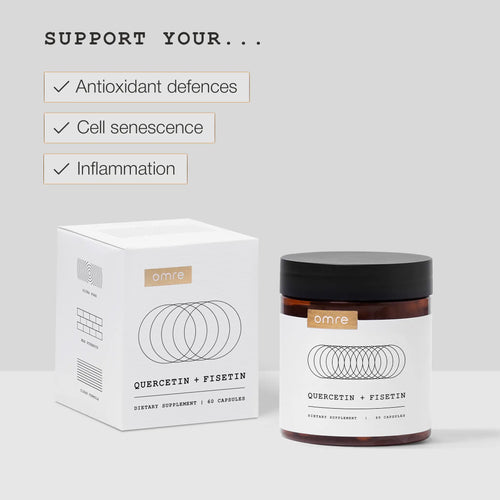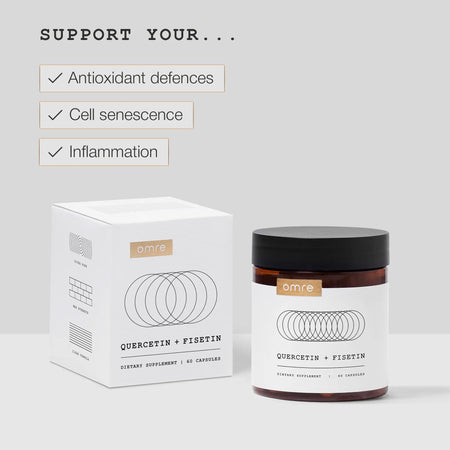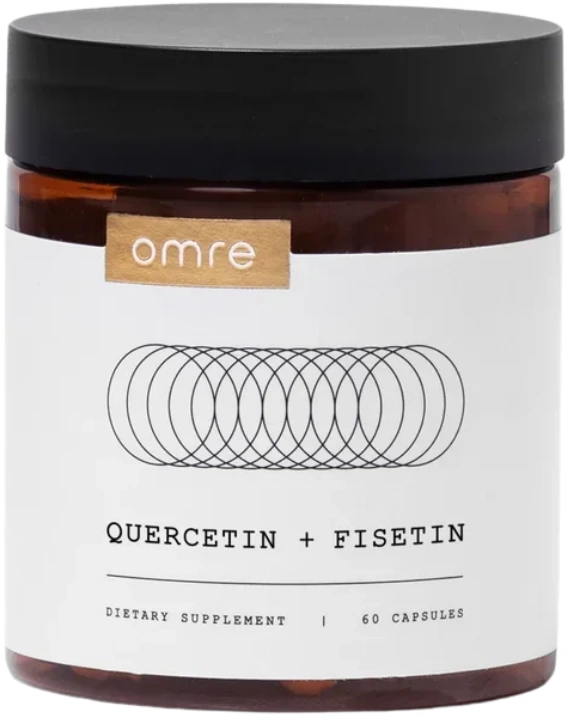Table of Contents
Looking for the best quercetin supplement? We reviewed top-rated quercetin products based on purity, bioavailability, third-party testing, and real-world results.
Whether you’re taking it for inflammation, immune health, or aging support, this list will help you make a smart choice.
Quercetin + Fisetin
Quercetin and Fisetin help manage 'zombie' senescent cell burden and support cellular rejuvenation.*
Best Quercetin Supplements At a Glance
Here’s a quick side-by-side comparison of our top picks so you can see what stands out before diving into the full reviews:
Best Quercetin Supplement: Our Top Picks
Best Overall for Senolytic Support – Omre Quercetin + Fisetin
Best Hypoallergenic Option – Pure Encapsulations Quercetin 500 mg
Best Budget Combo with Bromelain – Double Wood Quercetin + Bromelain
Best Value per Serving – Nutricost Quercetin + Bromelain
Best for Respiratory Health – NOW Foods Quercetin + Bromelain
Best High-Potency Quercetin – Toniiq Ultra High Purity Quercetin 1000 mg
1. Best Overall for Senolytic Support – Omre Quercetin + Fisetin
Contains: 500 mg Quercetin Phytosome, 100 mg Fisetin (98% purity)
Form: Vegetarian capsules
Bioavailability: Enhanced via phytosome delivery system
Price: $44.97 (30 servings), approx. $1.49/day
This formula combines two powerful senolytic compounds, Quercetin and Fisetin, in a single, research-backed blend. The Quercetin is in phytosome form, which enhances absorption, while the Fisetin is 98% pure, helping the body clear senescent cells more effectively. It's ideal if you're targeting aging at the cellular level.
Omre stands out for quality control, transparency, and its science-first approach. The formulation is clean, with no fillers or unnecessary ingredients, and every batch is tested for safety. It's a great pick if you're serious about longevity and cellular health.
The price is slightly higher than standard quercetin supplements, but you're getting two potent actives in one, both in clinically relevant doses. If you're looking for a daily anti-aging routine that’s simple and effective, this one covers your bases.
Pros:
Contains both Quercetin and Fisetin for dual senolytic action
Uses phytosome for better absorption
Doctor-formulated and third-party tested
Clean, allergen-free formula
Cons:
Pricier than basic quercetin products
Only 30 servings per bottle
2. Best Hypoallergenic Option – Pure Encapsulations Quercetin 500 mg
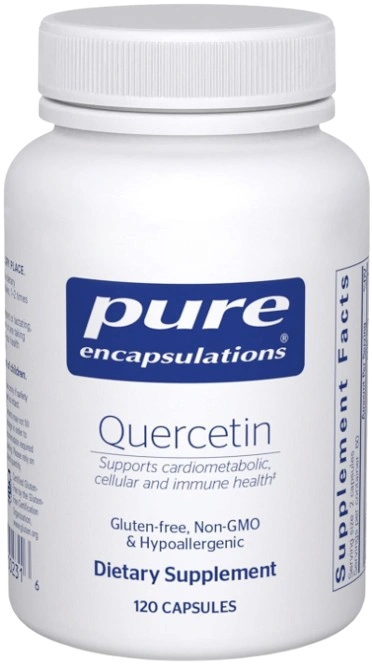 Key Details:
Key Details:
Contains: 500 mg Quercetin per 2-capsule serving
Form: Vegetarian capsules
Bioavailability Enhancers: None
Price: $48.40 for 120 capsules (60 servings), ~$0.81/day
Pure Encapsulations is a go-to brand for people with sensitivities or allergies. This product offers 500 mg of pure quercetin per serving and contains no unnecessary fillers, preservatives, or allergens, ideal if you’re following a restricted diet or working with a healthcare provider.
The formulation is straightforward, and while it lacks absorption enhancers like bromelain or vitamin C, it suits people who want to stack it with other supplements or take it in smaller doses throughout the day. The brand is also known for its stringent purity standards.
At just over 80 cents per day, it's not the cheapest option on the market, but you’re paying for clean, pharmaceutical-grade sourcing. A solid option if you need something gentle and dependable.
Pros:
Clean label with no allergens or artificial ingredients
Trusted brand among healthcare practitioners
Decent price for 60 servings
Suitable for sensitive individuals
Cons:
No bioavailability enhancer
Basic formula with no added synergistic ingredients
3. Best Budget Combo with Bromelain – Double Wood Quercetin + Bromelain
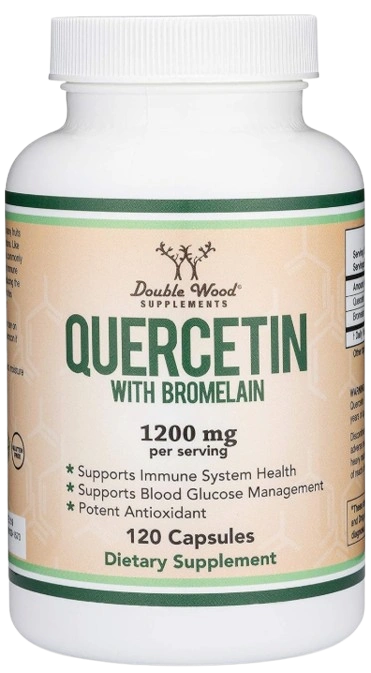 Key Details:
Key Details:
Contains: 1,000 mg Quercetin + 200 mg Bromelain per serving
Form: Capsules (120 count)
Bioavailability Enhancer: Bromelain
Price: $22.45 (60 servings), ~$0.37/day
Double Wood's combo of quercetin and bromelain is a budget-friendly pick for immune and inflammation support. With a strong 1,000 mg dose of quercetin and 200 mg of bromelain, this formula offers both potency and improved absorption.
The brand has a good reputation for third-party testing and transparency, making it a reliable choice for supplement shoppers on a budget. It’s also vegan and free from gluten and common allergens.
If you're looking to support seasonal allergies, general immunity, or exercise recovery, this product offers a solid foundation without breaking the bank. Just note that it doesn’t include advanced delivery tech.
Pros:
High dose of both quercetin and bromelain
Very affordable
Third-party tested
Vegan-friendly
Cons:
Standard absorption, no liposomal delivery
May not suit sensitive stomachs due to high bromelain dose
4. Best Value per Serving – Nutricost Quercetin + Bromelain
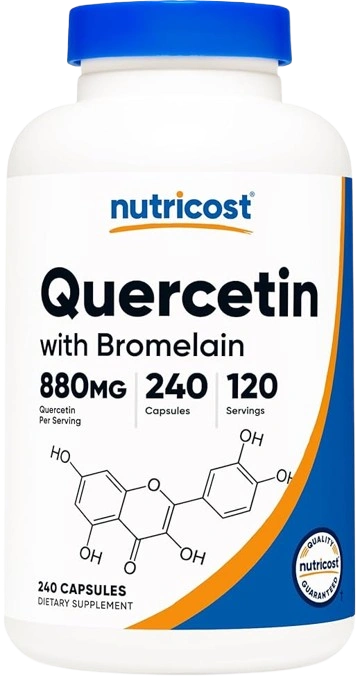 Key Details:
Key Details:
Contains: 880 mg Quercetin, 165 mg Bromelain per serving
Form: Vegetarian capsules
Bioavailability Enhancer: Bromelain
Price: $21.95 for 60 servings, ~$0.37/day
Nutricost delivers great value without cutting corners on quality. This supplement offers a near-gram dose of quercetin, paired with bromelain to improve absorption and inflammation support. It’s manufactured in a GMP facility and third-party tested.
While not as high in bromelain as some others, the overall formulation works well for most users and supports immune and respiratory health effectively. It’s especially useful during allergy season or for those dealing with inflammation-related issues.
This is a solid all-purpose quercetin pick for people who want reliability and affordability in one package.
Pros:
Excellent price per serving
Clean label and third-party tested
Includes bromelain for better absorption
60 full servings per bottle
Cons:
Lower bromelain dose compared to others
Not as targeted as senolytic-specific options
5. Best for Respiratory Health – NOW Foods Quercetin + Bromelain
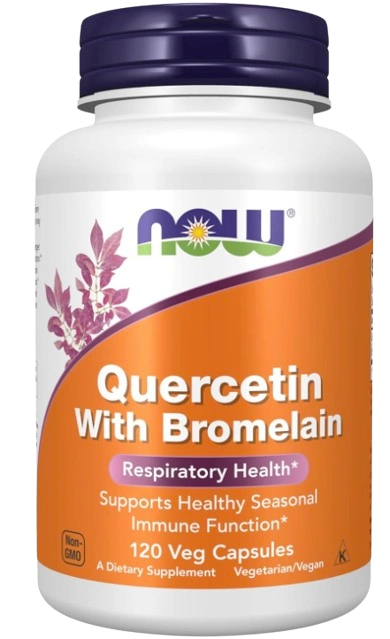 Key Details:
Key Details:
Contains: 800 mg Quercetin + 165 mg Bromelain
Form: Veg capsules (120 total)
Bioavailability Enhancer: Bromelain
Price: Varies, ~$20–25 per bottle
NOW Foods is a well-established supplement brand known for clean, budget-friendly products. This combo features 800 mg of quercetin and 165 mg of bromelain per serving, designed to support immune and respiratory function.
It’s particularly popular among people looking to manage seasonal allergies, asthma triggers, or inflammation from exercise or illness. With broad dietary compatibility and clean sourcing, it's a dependable choice.
Though the bromelain dose isn’t the highest, the formulation is well-balanced. For those seeking a reliable option from a brand with a long-standing reputation, this is an easy one to recommend.
Pros:
Balanced formula for immunity and allergy support
Kosher, vegan, and allergen-friendly
Reputable, family-owned brand
Well-priced for 60 servings
Cons:
Lacks advanced delivery system
Not targeted for senolytic benefits
6. Best High-Potency Quercetin – Toniiq Ultra High Purity Quercetin 1000 mg
 Key Details:
Key Details:
Contains: 1,000 mg Quercetin at 95% purity
Form: Capsules (120 total)
Bioavailability Enhancer: None, but standardized for high purity
Price: Around $25–30 (60 servings), ~$0.50/day
Toniiq delivers a potent quercetin formula with standout purity; each batch is standardized to contain 95%+ pure quercetin. That’s higher than most, making it ideal for people who want a high dose with clean sourcing.
While it doesn’t contain bromelain or vitamin C for absorption, the ultra-pure extract may still be more bioavailable than generic powders. It’s also lab-tested multiple times for contaminants and active ingredient levels.
This is a smart pick if you’re looking for high-dose quercetin with serious transparency and purity. It’s not stacked with extras, but it gets the job done for those focused on antioxidant and immune support.
Pros:
Extremely high quercetin purity (95%+)
Strong dose at 1,000 mg per serving
Lab-tested for quality and potency
Vegan and GMP-certified
Cons:
No absorption enhancer included
High dose may not be ideal for everyone
What Is Quercetin?
Quercetin is a plant-based antioxidant known for its anti-inflammatory and immune-supporting properties. It’s a natural flavonoid found in many fruits, vegetables, and teas, and is one of the most widely consumed flavonoids in the human diet.
Your body encounters free radicals daily, unstable molecules that can damage cells and speed up aging or disease. Antioxidants like quercetin help counteract that damage by neutralizing these free radicals.
It’s especially abundant in foods like onions, apples, grapes, berries, broccoli, and green tea. However, most people only get 10–100 mg of quercetin daily from diet alone. Supplements offer a convenient way to reach therapeutic levels of 500–1,000 mg per day.
Quercetin is also gaining attention for its potential role in cellular health and aging, especially when combined with other compounds like bromelain, vitamin C, or fisetin to enhance absorption and biological effects.
Quercetin + Fisetin
Quercetin and Fisetin help manage 'zombie' senescent cell burden and support cellular rejuvenation.*
Potential Benefits of Quercetin Supplements
 Quercetin supplements have been studied for a variety of health effects. Here are some of the most promising benefits backed by research:
Quercetin supplements have been studied for a variety of health effects. Here are some of the most promising benefits backed by research:
Helps reduce chronic inflammation
Quercetin’s anti-inflammatory effects are among its best-known benefits. Studies have found it can suppress inflammatory markers like TNF-alpha and interleukin-6 (IL-6), which are linked to chronic conditions such as arthritis and heart disease (1).
According to a double-blind clinical trial in women with rheumatoid arthritis, taking 500 mg of quercetin daily for 8 weeks significantly reduced morning stiffness and pain compared to placebo (2).
This effect is likely due to quercetin’s ability to modulate the NF-κB signaling pathway, which regulates inflammatory responses throughout the body.
Supports immune function
Quercetin may help your immune system stay balanced and strong, especially during viral infections or allergy flare-ups. It acts as a zinc ionophore, meaning it helps shuttle zinc into cells where it can support antiviral activity.
One animal study found quercetin reduced viral replication and improved recovery rates in influenza-infected mice. In humans, it’s often studied in combination with zinc or vitamin C (3).
It’s also known to stabilize mast cells and reduce histamine release, making it useful for people dealing with immune overactivity, such as in allergies or autoimmune conditions.
May lower blood pressure
There’s evidence that quercetin can relax blood vessels and reduce blood pressure, especially in people with hypertension. It does this by improving nitric oxide availability and reducing oxidative stress in blood vessel linings.
A meta-analysis of 9 randomized controlled trials (580 participants) found that doses above 500 mg per day led to significant reductions in both systolic (by 5.8 mmHg) and diastolic (by 2.6 mmHg) blood pressure (4).
This effect makes quercetin a potential option for supporting heart health in combination with lifestyle changes.
Combats seasonal allergies
Quercetin is a natural antihistamine. It works by blocking the release of histamine and other pro-inflammatory compounds from mast cells, helping to reduce allergy symptoms like sneezing, runny nose, and itchy eyes.
In preclinical models, quercetin has shown promise in reducing allergic responses to common triggers like pollen and peanuts (5). In one study on mice, quercetin suppressed anaphylactic reactions related to peanut exposure (6).
While human trials are still limited, many allergy sufferers report symptom relief when using quercetin during allergy season, especially when paired with bromelain.
Protects brain and heart health
Thanks to its antioxidant and anti-inflammatory properties, quercetin may help protect against neurodegenerative and cardiovascular diseases.
In a mouse study, quercetin injections reversed Alzheimer’s-related changes and improved cognitive function. It also reduced markers of brain aging in early-stage disease models (7).
On the cardiovascular side, quercetin helps reduce LDL oxidation and improve endothelial function, which are both important for preventing atherosclerosis (8).
While most findings are from animal or lab studies, the potential for brain and heart support is encouraging.
Supports senolytic activity when paired with Fisetin
Senescent cells, or “zombie cells,” stop dividing but refuse to die. They build up with age and release harmful substances that accelerate tissue damage and inflammation.
Quercetin has shown senolytic activity, especially when paired with another flavonoid called fisetin. Together, they may help the body clear these aged, dysfunctional cells and promote tissue rejuvenation (9).
In a widely cited study, the combo of quercetin and dasatinib selectively eliminated senescent cells in mice, improving physical function and lifespan (10). While fisetin is now preferred for senolytic potency, quercetin still plays a supporting role.
For those focused on healthy aging, quercetin plus fisetin is a promising combination worth exploring.
Are There Any Side Effects of Quercetin?
Quercetin is generally safe for most people when taken in appropriate doses, but high amounts may cause mild side effects. Most studies use doses between 500 and 1,000 mg per day without serious safety concerns (11).
Some people may experience minor issues like headaches, upset stomach, or tingling sensations, especially at doses above 1,000 mg per day (12).
If you’re pregnant, breastfeeding, or taking medications (like antibiotics or blood pressure drugs), it’s best to speak with a healthcare provider before starting a quercetin supplement.
While quercetin from food is completely safe, supplements deliver much higher doses, which is why it’s important to follow label directions and monitor how your body responds.
Choosing third-party tested, clean-label products can also reduce the risk of unwanted effects.
How to Choose the Best Quercetin Supplement
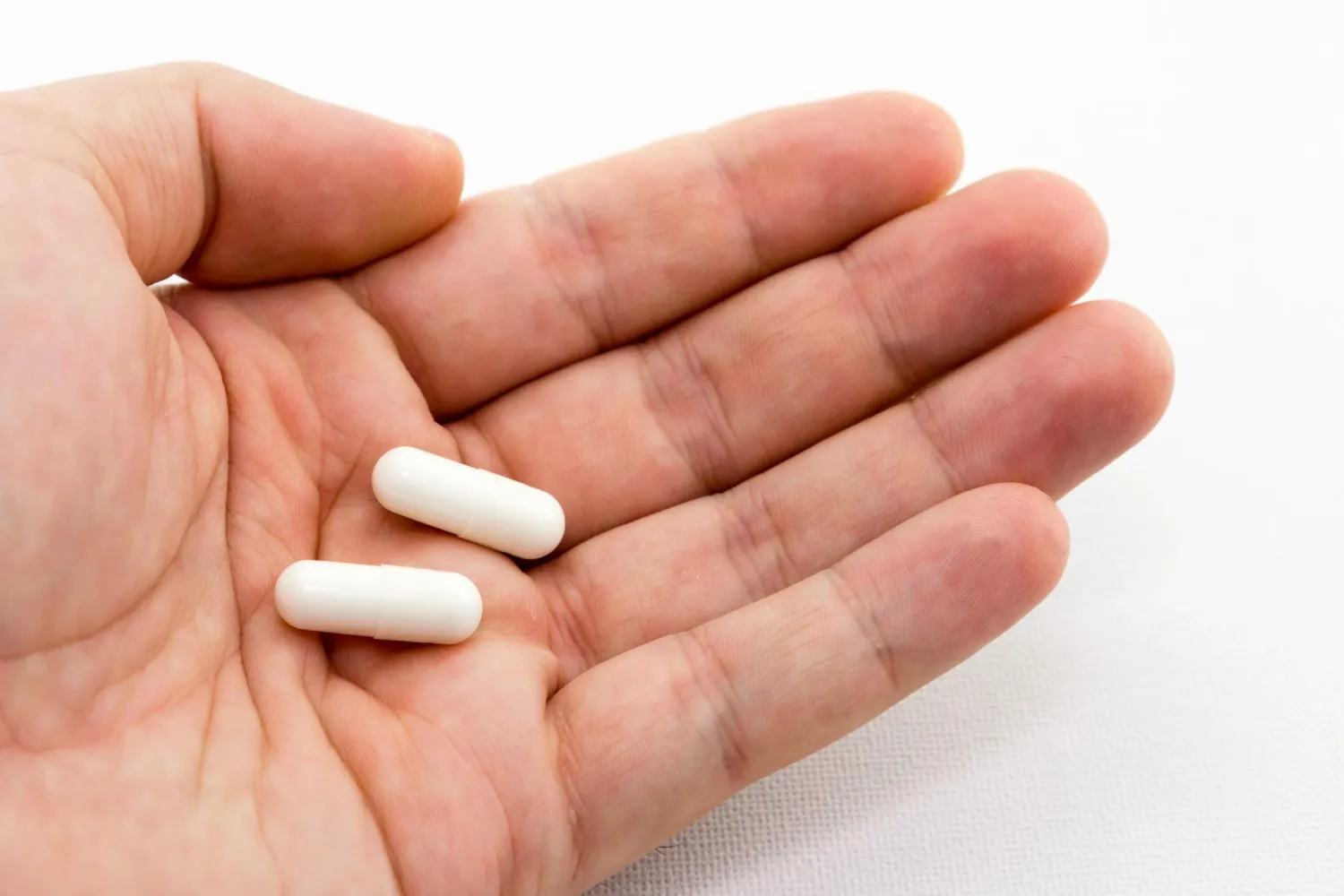 Not all quercetin supplements are created equal. Some deliver better absorption, while others include added compounds that enhance effectiveness or support specific health goals. The right pick depends on what you're using it for, whether it’s allergy relief, inflammation, or long-term cellular support.
Not all quercetin supplements are created equal. Some deliver better absorption, while others include added compounds that enhance effectiveness or support specific health goals. The right pick depends on what you're using it for, whether it’s allergy relief, inflammation, or long-term cellular support.
Here are a few things to look for when choosing the best quercetin supplement:
Purity and sourcing: Look for quercetin sourced from plants like Sophora japonica, and opt for brands that disclose ingredient origin and testing standards.
Dose (ideally 500–1000 mg daily): Most studies show benefits in this range. Lower doses from food alone typically aren’t enough for therapeutic effect.
Bioavailability (with bromelain, vitamin C, or lipid-based delivery): Quercetin is poorly absorbed on its own. Pairing it with bromelain, vitamin C, or using a phytosome/liposomal form can improve uptake.
Third-party testing: Always choose products that are independently tested for potency, purity, and contaminants.
Capsule vs powder vs liposomal: Capsules are convenient, powders are flexible for dosing, and liposomal forms may offer better absorption.
Formulation (standalone vs combo like Fisetin or Resveratrol): Standalone quercetin is great for allergies and immune health. For anti-aging or senolytic support, combinations with Fisetin or Resveratrol offer added benefits.
Quercetin-Rich Foods
You can get small amounts of quercetin through a variety of fruits and vegetables. Here are some of the top natural sources:
Onions (especially red and yellow)
Apples (with skin)
Grapes
Berries (especially cranberries and blueberries)
Broccoli
Kale and spinach
Green and black tea
Capers
Cherries
Red wine
Citrus fruits
Quercetin Dosage
Most studies recommend a daily dose of 500 to 1,000 mg of quercetin for health benefits. This range appears safe and effective for reducing inflammation, supporting immune health, and improving vascular function.
For general use, 500 mg per day is a good starting point. If you’re using it to target specific concerns like seasonal allergies or blood pressure, 800 to 1,000 mg may be more effective.
Look for formulas that include absorption boosters like bromelain or vitamin C to help your body use quercetin more efficiently.
Because quercetin has low natural bioavailability, some people prefer liposomal forms or combinations with synergistic ingredients like fisetin.
Dividing doses throughout the day may also help maintain steady levels in the body.
Final Words
Quercetin is one of the most researched flavonoids, with a growing body of evidence supporting its role in reducing inflammation, supporting immune function, and even promoting healthy aging.
Whether you’re taking it to help with seasonal allergies or to support your cells as you age, the right supplement can make a difference.
From basic formulas to advanced combinations, there’s a quercetin supplement out there for nearly every health goal and budget.
If you're looking for a high-quality option that also supports senolytic activity, Omre Quercetin + Fisetin is a standout pick thanks to its clean ingredients and evidence-based formula.
Interested in supporting your long-term health at the cellular level? Check availability for Omre Quercetin + Fisetin.
FAQs
Can I take quercetin every day?
Yes, daily use is considered safe for most adults at doses of 500–1000 mg. Many studies use this range over weeks or months without side effects.
What is the best time of day to take quercetin?
There’s no exact timing required, but taking it in the morning or with meals may help reduce any chance of stomach discomfort.
Is it better to take quercetin with or without food?
Taking quercetin with food, especially something that contains a bit of fat, can improve absorption. Some supplements also include enhancers like bromelain to help.
Do you need bromelain or vitamin C with quercetin?
They’re not required, but they do help. Bromelain may increase absorption, and vitamin C helps support antioxidant function. These ingredients can make quercetin more effective.




